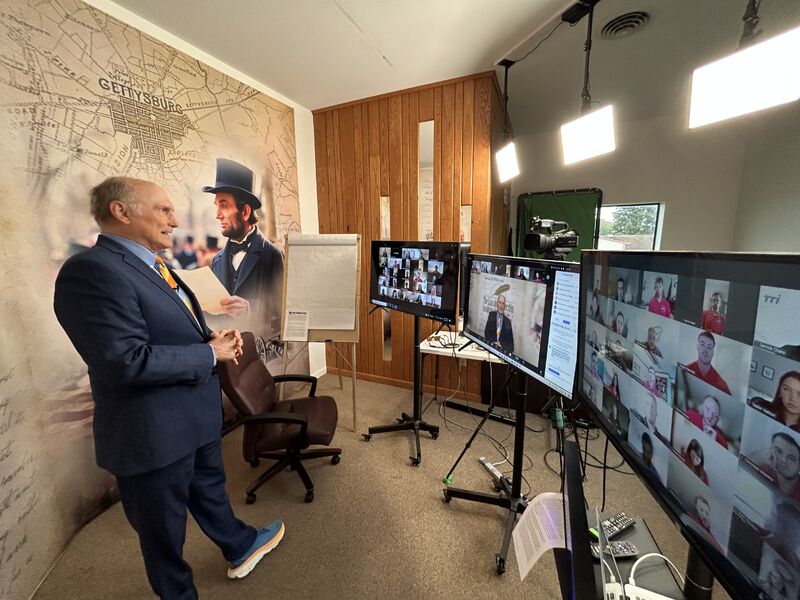
Faculty Corner: Leaders Create Meaning by Dr. Judy Morley
By Dr. Judy Morley
Published on December 8, 2020
How are you doing with the state of the world? Have you taken time to stop and reflect? This year has not been easy. It feels like the universe is trying to tell us something. And the truth is, it is.
Everything happens for a reason. I think most people believe that—but many of us struggle to know what that reason is. How do we find meaning in such challenging and seemingly random events? More importantly, how do we lead others to understand the meaning?
The Three-Step Process for Creating Meaning
Step 1: Process Your Own Emotions
The first thing we have to do is to process our own emotions. This takes time, and many of us aren't good at it. We have experience processing some of our emotions, particularly grief, because we've had experiences that forced us to do it. When it comes to global events, however, we don't think about them the same way. They don't feel as personal, so we don't think about how they affect us individually.
We continue to focus on our daily lives without addressing how we feel about what's going on around us. This can leave us with low-grade anxiety and free-floating stress that impacts our performance and our teams. It is important to take time to just feel about events. By identifying and feeling uncomfortable emotions, we can move on to the next step.
Step 2: See the Bigger Picture
Second, we need to see a bigger picture. Once we understand how we feel, we can shift our perspective to see how events are impacting others. Staying focused on our small view keeps us from understanding how interconnected we are.
Isn't that the message of COVID-19? Aren't we wearing masks because we know our breath intermingles? Can we see racial injustice as a crime against humanity, rather than a particular group? Seeing the bigger picture takes empathy and understanding, which forces us to strengthen our emotional intelligence and grow as people.
Step 3: Create Meaning
Finally, we can create meaning. I don't believe in coincidence. Even though things can look random, plenty of studies have shown that there is order in chaos. The meaning of events is a personal thing, and we create it by being in touch with our emotions and seeing a broader perspective. This is what keeps us evolving, learning and growing.
Lincoln's Master Class in Creating Meaning
Leaders create meaning by defining the circumstances. Abraham Lincoln knew this when he delivered the Gettysburg Address in November 1863. Public opinion hadn't yet decided how to interpret the Battle of Gettysburg, the bloodiest battle of the Civil War. Many believed it was an unacceptable loss of life for a cause that seemed to be in vain.
Lincoln changed that perception by defining the meaning of the battle as a "new birth of freedom," a definition that has lasted 157 years.
The Power of Choice in Meaning-Making
What story will you tell about 2020? Was it the year from hell? Or was it the year that taught you to innovate, brought your team closer together, forced you to streamline operations, and redefined your brand? You get to choose whatever meaning you want to create.
Practical Applications for Leaders
Personal Emotional Processing
Before you can help others find meaning, you must process your own emotions about challenging events:
- Schedule reflection time - Block time in your calendar specifically for emotional processing
- Name your feelings - Be specific about what you're experiencing (frustrated vs. overwhelmed vs. disappointed)
- Journal or talk it out - Don't keep emotions bottled up; find healthy outlets
- Seek professional help when needed - Some events require professional support to process properly
Expanding Perspective
Help yourself and your team see beyond immediate impacts:
- Ask broader questions - How is this affecting our customers, community, industry, society?
- Study interconnections - What ripple effects are you noticing?
- Practice empathy - Deliberately consider how events impact people different from you
- Gather diverse viewpoints - Seek input from people with different backgrounds and perspectives
Creating Constructive Meaning
Guide your organization toward productive interpretations:
- Focus on growth - What capabilities is this challenge forcing you to develop?
- Identify opportunities - What new possibilities are emerging from the disruption?
- Reinforce values - How can this situation strengthen your commitment to what matters most?
- Define purpose - How does this challenge clarify your organization's mission?
Questions for Reflection
Consider these questions as you work through challenging events:
Emotional Processing
- What emotions am I experiencing about current events? Have I given myself permission to feel them?
- How are these emotions affecting my decision-making and leadership?
- What support do I need to process these feelings in healthy ways?
Broader Perspective
- How are current events affecting people beyond my immediate circle?
- What interconnections am I seeing that I didn't notice before?
- How can I better understand the experiences of others during this time?
Meaning Creation
- What growth opportunities are emerging from current challenges?
- How can I frame these events in ways that inspire rather than defeat my team?
- What positive changes might not have happened without this disruption?
The Leadership Imperative
As leaders, our responsibility goes beyond managing immediate challenges. We must help our teams process emotions, understand broader implications, and create constructive meaning from difficult experiences.
This isn't about toxic positivity or pretending challenges don't exist. It's about acknowledging the full reality of difficult situations while choosing to frame them in ways that promote growth, learning, and resilience.
The Lincoln Standard
When you face your next major challenge, ask yourself: "How would Lincoln frame this? What meaning would he create that could inspire people 157 years from now?"
The events of 2020 tested us all. But like Lincoln at Gettysburg, we have the power to define what these experiences mean. We can choose to see them as devastating losses, or as the foundation for a "new birth" of whatever values matter most to us.
The choice—and the meaning—is ours to create.
Dr. Judy Morley is a faculty member at Lincoln Leadership Institute, bringing expertise in organizational psychology and leadership development to help executives navigate complex challenges with wisdom and resilience.




